Facebook Addiction Lawsuits: Social Media Accountability
- Last Updated: July 14th, 2025

Attorney Jessica Paluch-Hoerman, founder of TruLaw, has over 28 years of experience as a personal injury and mass tort attorney, and previously worked as an international tax attorney at Deloitte. Jessie collaborates with attorneys nationwide — enabling her to share reliable, up-to-date legal information with our readers.
Legally Reviewed
This article has been written and reviewed for legal accuracy and clarity by the team of writers and legal experts at TruLaw and is as accurate as possible. This content should not be taken as legal advice from an attorney. If you would like to learn more about our owner and experienced injury lawyer, Jessie Paluch, you can do so here.
Fact-Checked
TruLaw does everything possible to make sure the information in this article is up to date and accurate. If you need specific legal advice about your case, contact us by using the chat on the bottom of this page. This article should not be taken as advice from an attorney.
Key takeaways:
- Individuals who believe they've been harmed by Facebook's addictive features may be eligible to join ongoing lawsuits.
- Lawsuits allege Facebook knew its algorithms exploited teen psychology to drive engagement, prioritizing growth over user well-being.
- Those seeking to join the consolidated Facebook addiction lawsuits should confirm eligibility, find a participating lawyer, review case details, file a claim, and stay informed as the multidistrict litigation progresses toward potential settlements.
Overview of Facebook Addiction Lawsuits
On this page, we’ll discuss Facebook Addiction Lawsuits, potential impacts of Facebook addiction on mental health, legal grounds for filing a Facebook lawsuit, and much more.
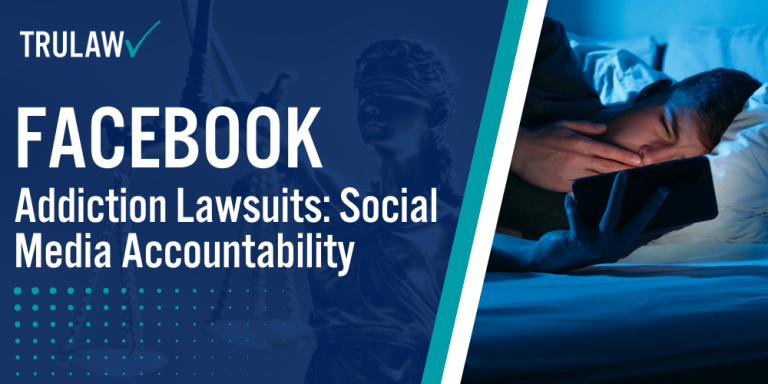
Intro to Facebook Addiction Lawsuits
Some key aspects of Facebook Addiction Lawsuits include:
- Addictive Design: Claims that Facebook’s design, including notifications and endless scrolling, is intentionally addictive.
- Mental Health Consequences: Allegations that Facebook addiction can lead to depression, anxiety, and other mental health issues.
- Inadequate User Protection: Accusations that Facebook fails to implement sufficient measures to protect users from the harmful effects of addiction.
- Mishandling User Data: Claims that Facebook’s misuse of user data contributes to the platform’s addictive nature and mental health impact.
If you or someone you love has experienced mental health problems due to Facebook addiction, you may be eligible to pursue compensation.
Contact TruLaw using the chat on this page for an instant case evaluation to determine if you qualify to join others filing Facebook Addiction Lawsuits.
Table of Contents
Who Is Eligible to File a Facebook Addiction Lawsuit?
To consider filing a Facebook addiction lawsuit, an individual must typically prove that the use of the platform has led to addiction-like behavior with substantial negative consequences.
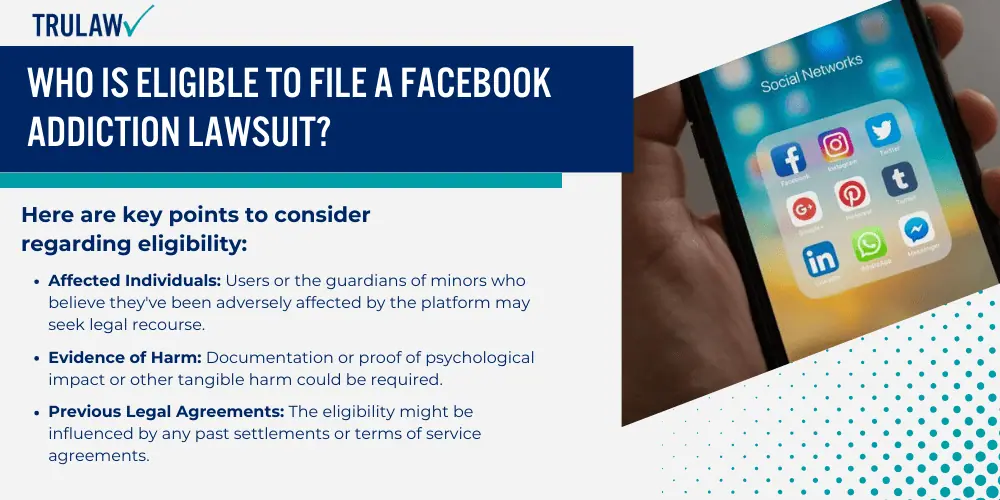
Here are key points to consider regarding eligibility:
- Affected Individuals: Users or the guardians of minors who believe they’ve been adversely affected by the platform may seek legal recourse.
- Evidence of Harm: Documentation or proof of psychological impact or other tangible harm could be required.
- Previous Legal Agreements: The eligibility might be influenced by any past settlements or terms of service agreements.
- Location and Jurisdiction: The ability to file may also depend on state laws or the specific legal jurisdiction in which the social media addiction lawsuit is being considered.
How Facebook Intentionally Addicts Vulnerable Teen Users
Facebook has faced significant scrutiny over its practices that appear to target vulnerable young users, potentially leading to social media addiction.
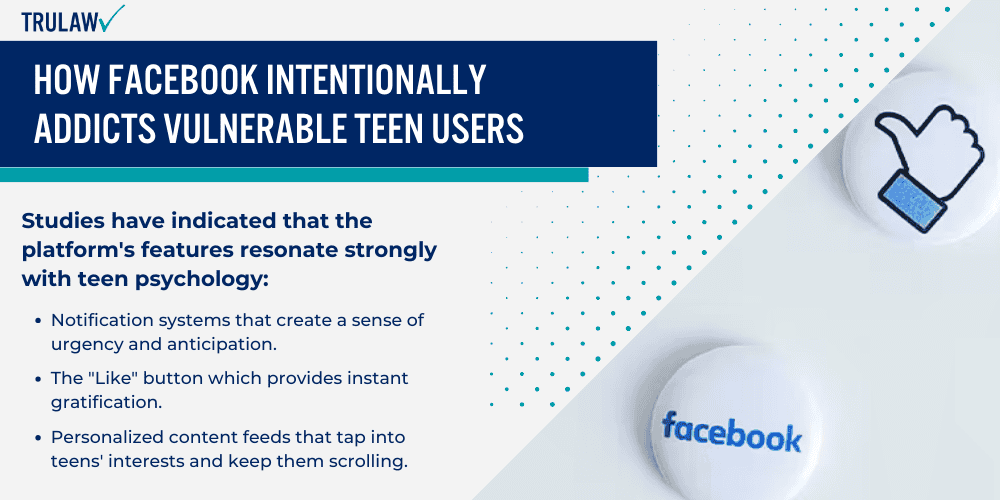
Facebook’s Algorithms Exploit Teen Psychology
Facebook’s algorithms have been designed to hook adolescents by capitalizing on their innate desires for social connection and validation.
Studies have indicated that the platform’s features resonate strongly with teen psychology:
- Notification systems that create a sense of urgency and anticipation.
- The “Like” button which provides instant gratification.
- Personalized content feeds that tap into teens’ interests and keep them scrolling.
- Friend suggestions that promise a broader sense of connectedness.
These features collectively contribute to creating a seductive environment that can lead to excessive use, described by some as social media adolescent addiction.
Internal Research Shows Facebook Knew the Risks
A deep dive into Facebook’s internal research paints a troubling picture of the company’s awareness of the potential harm its platforms can cause.
Key findings include:
- Internal studies acknowledged the link between platform use and deteriorating mental health in young users.
- Research indicated that algorithm changes intended to improve user engagement could exacerbate feelings of inadequacy and anxiety among teens.
- Documentation showed a recognition of how features might encourage incessant checking of the platform.
- Evidence suggested that despite knowledge of these risks, little action was taken to mitigate potential addiction.
By piecing together this internal documentation, it becomes apparent that Facebook was not only aware of the addictive nature of its social media platforms but also the specific risks they posed to adolescent users.
Injuries and Harm Caused by Facebook Addiction in Teens
The alarming rise in Facebook addiction has sparked significant concerns surrounding the mental and physical well-being of teenagers.
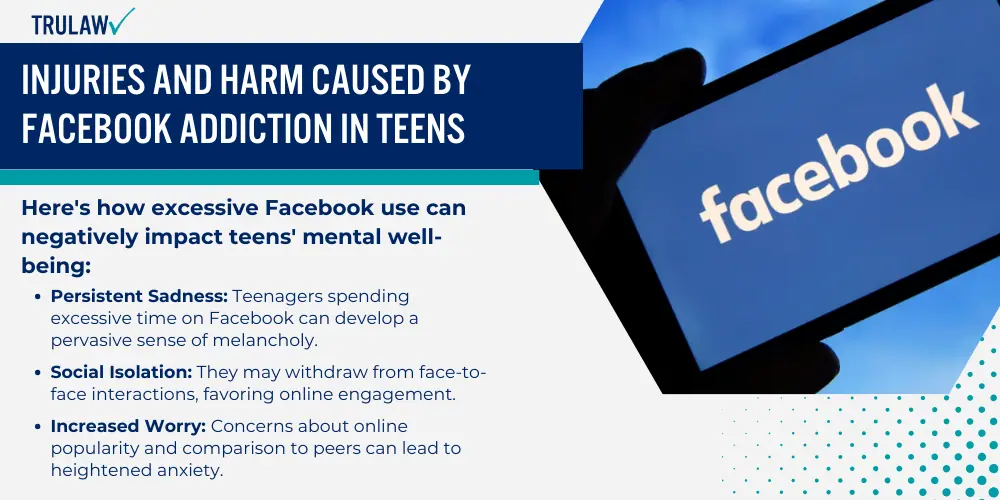
Particularly, teenage girls are experiencing a spectrum of adverse effects, spanning from mental health issues to body image problems.
Mental Health Issues Like Depression and Anxiety
Mental health is profoundly impacted by Facebook addiction, where teens exhibit signs of depression and anxiety at worrying levels.
It is documented that constant exposure to the platform can elicit feelings of inadequacy and low self-esteem.
Here’s how excessive Facebook use can negatively impact teens’ mental well-being:
- Persistent Sadness: Teenagers spending excessive time on Facebook can develop a pervasive sense of melancholy.
- Social Isolation: They may withdraw from face-to-face interactions, favoring online engagement.
- Increased Worry: Concerns about online popularity and comparison to peers can lead to heightened anxiety.
- Sleep Interruption: Overuse of social media, especially before bedtime, is linked to poor sleep quality and patterns.
Eating Disorders and Body Image Problems from Facebook
Eating disorders are increasingly prevalent among teens, with Facebook playing a role in exacerbating body image issues.
Pursuing validation through ‘likes’ and comments can distort one’s body perception.
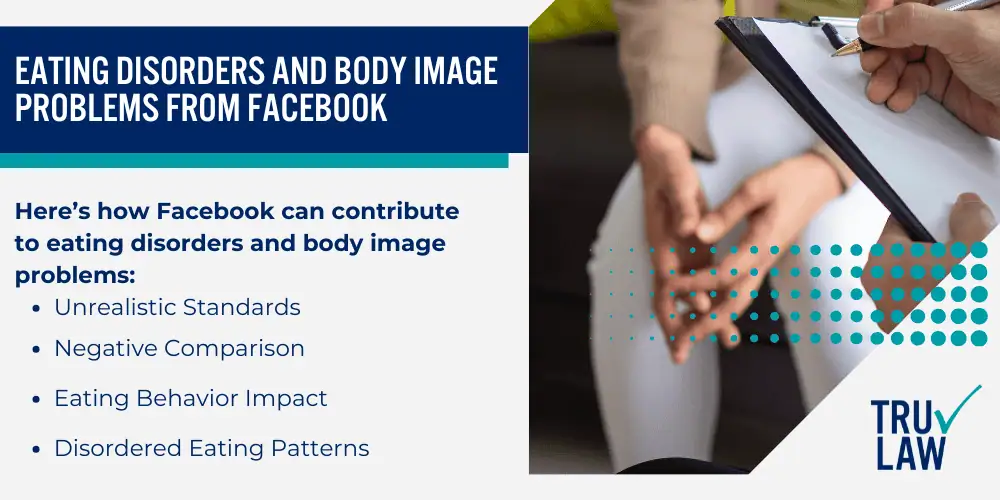
Here’s how Facebook can contribute to eating disorders and body image problems:
- Unrealistic Standards: The platform can perpetuate unattainable beauty ideals, influencing teen self-image.
- Negative Comparison: Exposure to edited images can harm body comparison, particularly among teenage girls.
- Eating Behavior Impact: Teens may alter their eating habits due to dissatisfaction with their bodies or in an attempt to mimic those they see online.
- Disordered Eating Patterns: The pressure for a ‘perfect’ online appearance can cause extreme dieting, which may segue into disordered eating.
Facebook Prioritized Profits Over Protecting Teen Users
Recent legal actions have highlighted serious concerns about the possible harm social media platforms, especially Facebook, might cause to young users.
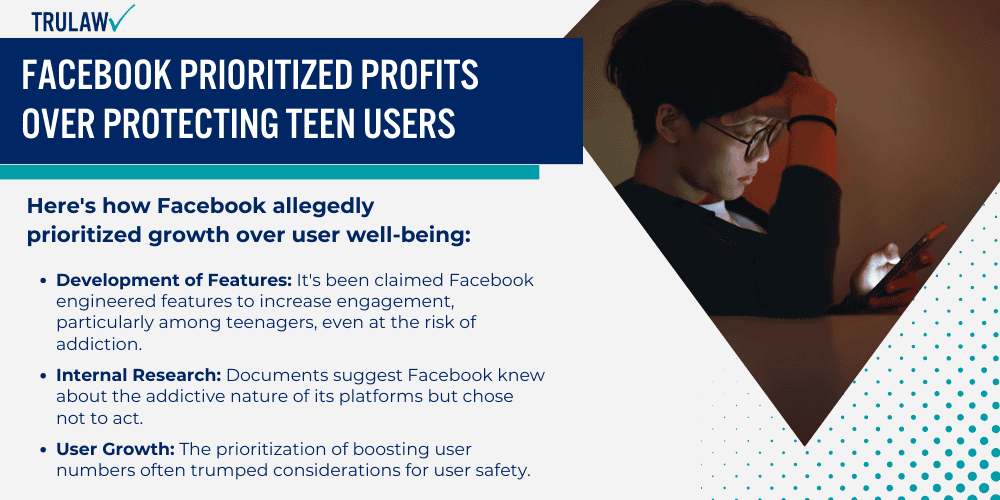
These allegations suggest that the focus on growth and revenue overshadowed the necessary measures to safeguard adolescents’ well-being.
Accusations Facebook Ignored Addiction Issues to Boost Growth
Many allegations have been raised against Facebook, claiming that the social media giant deliberately disregarded how its platforms could be addictive to social media users.
They argue that this was done to fuel the platform’s growth.
Here’s how Facebook allegedly prioritized growth over user well-being:
- Development of Features: It’s been claimed Facebook engineered features to increase engagement, particularly among teenagers, even at the risk of addiction.
- Internal Research: Documents suggest Facebook knew about the addictive nature of its platforms but chose not to act.
- User Growth: The prioritization of boosting user numbers often trumped considerations for user safety.
- Monetization Efforts: Critics argue Facebook used data on teenage behavior to improve their ad-targeting algorithms, thus enhancing their profits.
Lawsuits Claim Facebook Failed to Warn of Risks
Legal actions have been initiated, with claims centered around Facebook’s failure to adequately inform users and the public about the potential risks of platform use.
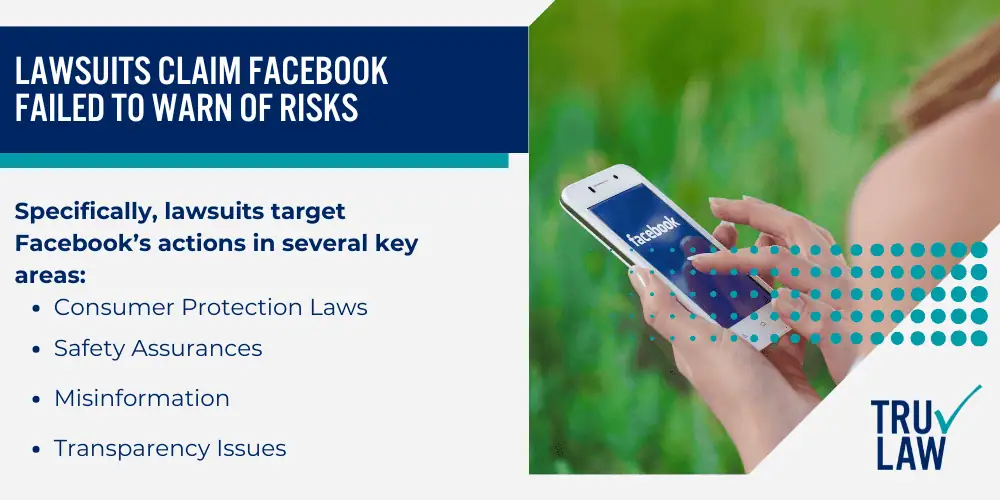
Specifically, lawsuits target Facebook’s actions in several key areas:
- Consumer Protection Laws: Facebook has been accused of violating consumer protection laws by not being upfront about the potential harm their platforms could inflict.
- Safety Assurances: Despite knowledge to the contrary, Facebook is said to have assured the public that its features were safe for children.
- Misinformation: Lawsuits claim the social media company downplayed research about the adverse effects its platforms can have on young people’s mental health.
- Transparency Issues: There is an ongoing call for Facebook to be more transparent about its internal findings on platform safety and risks.
Status of the Facebook Addiction Lawsuits
In recent developments, a wave of legal actions has surged against Facebook, alleging harms related to addictive features on its social media accounts.
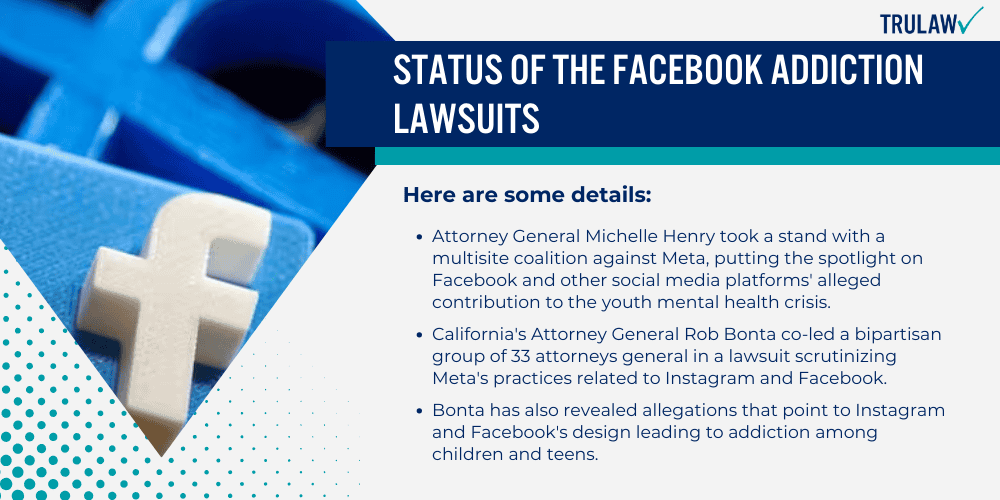
Various state attorneys general have initiated these suits, focusing on Meta Platforms, Inc.’s responsibility.
Growing Number of Lawsuits Filed Against Facebook/Meta
Legal actions continue to grow as more states join the campaign against Meta, claiming the company’s social media platforms cause psychological and emotional harm, especially to younger users.
Here are some details:
- Attorney General Michelle Henry took a stand with a multisite coalition against Meta, putting the spotlight on Facebook and other social media platforms’ alleged contribution to the youth mental health crisis.
- California’s Attorney General Rob Bonta co-led a bipartisan group of 33 attorneys general in a lawsuit scrutinizing Meta’s practices related to Instagram and Facebook.
- Bonta has also revealed allegations that point to Instagram and Facebook’s design leading to addiction among children and teens.
- The social media lawsuit from Colorado showed a similar pattern, involving 42 attorneys general and raising concerns over Instagram’s addictive features.
Facebook Lawsuits Consolidated into MDL Class Action
The federal courts have taken a significant step in addressing the issue by consolidating the lawsuits into multidistrict litigation (MDL), streamlining the legal process.
Essential points include:
- The Judicial Panel on Multidistrict Litigation deemed it fit to consolidate pretrial procedures.
- This class action approach suggests an expectation for a comprehensive resolution across the multiple filed social media lawsuits.
- These cases under one umbrella allow for a more efficient legal process, potentially leading to a unified settlement or judgment.
- It ensures consistent court rulings and helps manage evidence and testimonies overlapping among individual cases.
The strategic move to consolidate into an MDL reflects the serious stance taken by the judicial system in addressing the allegations against Meta and its influence on user behavior through its social media platforms.
Proving Liability and Causation in Facebook Lawsuits
Facebook addiction lawsuits challenge the company’s responsibility in creating platforms that may foster addiction.
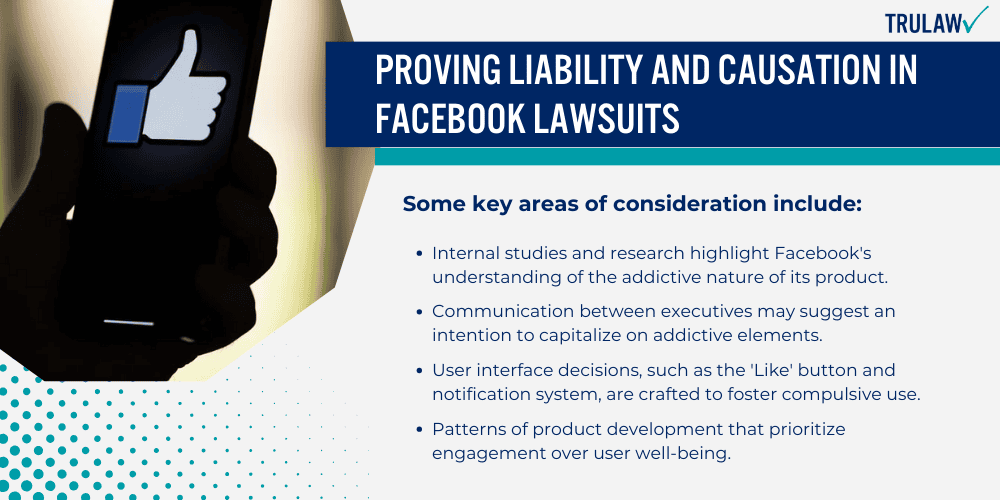
Claimants argue that Facebook’s knowledge and actions have caused tangible harm.
Establishing Facebook Knowingly Made Product Addictive
Attorneys in litigation against Facebook focus on unveiling company documents that purportedly show the social media giant designed features to make its platform addictive.
Some key areas of consideration include:
- Internal studies and research highlight Facebook’s understanding of the addictive nature of its product.
- Communication between executives may suggest an intention to capitalize on addictive elements.
- User interface decisions, such as the ‘Like’ button and notification system, are crafted to foster compulsive use.
- Patterns of product development that prioritize engagement over user well-being.
Linking Specific Injuries to Facebook Addiction
Proving causation is about connecting Facebook’s addictive features to demonstrable harm.
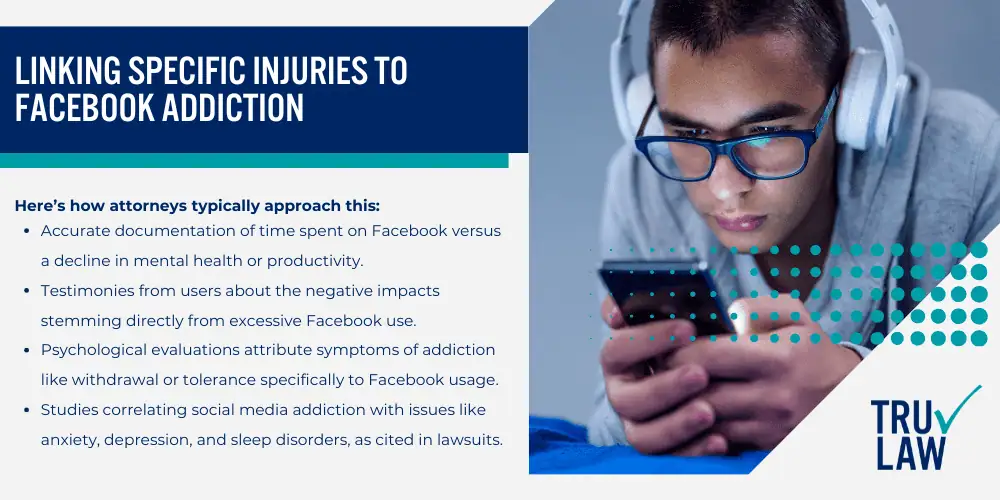
Here’s how attorneys typically approach this:
- Accurate documentation of time spent on Facebook versus a decline in mental health or productivity.
- Testimonies from users about the negative impacts stemming directly from excessive Facebook use.
- Psychological evaluations attribute symptoms of addiction like withdrawal or tolerance specifically to Facebook usage.
- Studies correlating social media addiction with issues like anxiety, depression, and sleep disorders, as cited in lawsuits.
Potential Settlement Amounts in Facebook Lawsuits
When considering lawsuits against Facebook for addiction concerns, the settlement amounts hinge heavily on specific case factors and the gravity of alleged injuries.
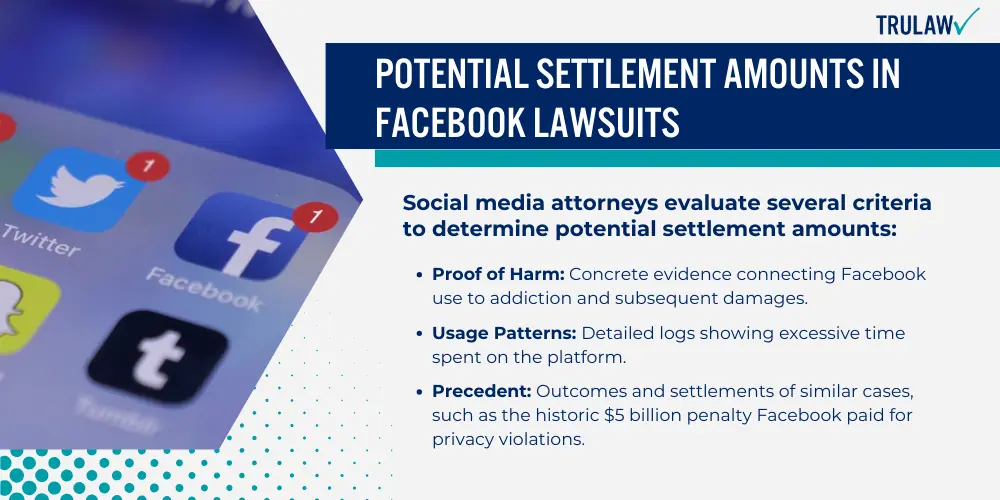
Factors Impacting Potential Facebook Settlement Payouts
Individuals who can demonstrate harm caused by excessive Facebook use may be eligible for compensation.
The amount of compensation awarded depends on the harm’s severity and the evidence’s strength.
Social media attorneys evaluate several criteria to determine potential settlement amounts:
- Proof of Harm: Concrete evidence connecting Facebook use to addiction and subsequent damages.
- Usage Patterns: Detailed logs showing excessive time spent on the platform.
- Precedent: Outcomes and settlements of similar cases, such as the historic $5 billion penalty Facebook paid for privacy violations.
- Negligence: The degree to which Facebook may have ignored the addictive nature of its platform.
Estimated Settlement Ranges for Different Injury Severity
Understanding the impact of your injury on the settlement range is crucial.
Generally, compensation reflects the degree of physical, emotional, and financial hardship you’ve endured.
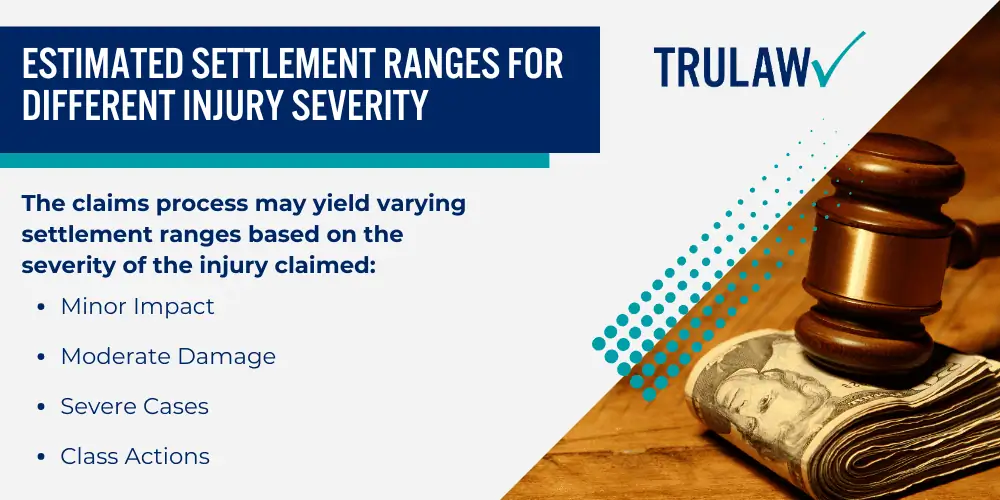
The claims process may yield varying settlement ranges based on the severity of the injury claimed:
- Minor Impact: Settlements for less severe impact might involve compensation for therapy costs or minor lifestyle adjustments.
- Moderate Damage: This could include lost wages due to productivity drops and higher therapy expenses.
- Severe Cases: In profound personal turmoil or health deterioration, the amounts could scale significantly to cover extensive rehabilitation.
- Class Actions: When multiple plaintiffs come together, settlements can be distributed among them, often resulting in larger aggregate payouts but smaller individual shares.
How to Join the Facebook Addiction Lawsuits
Individuals concerned about social media’s impact on their lives may consider joining the legal action against Facebook.
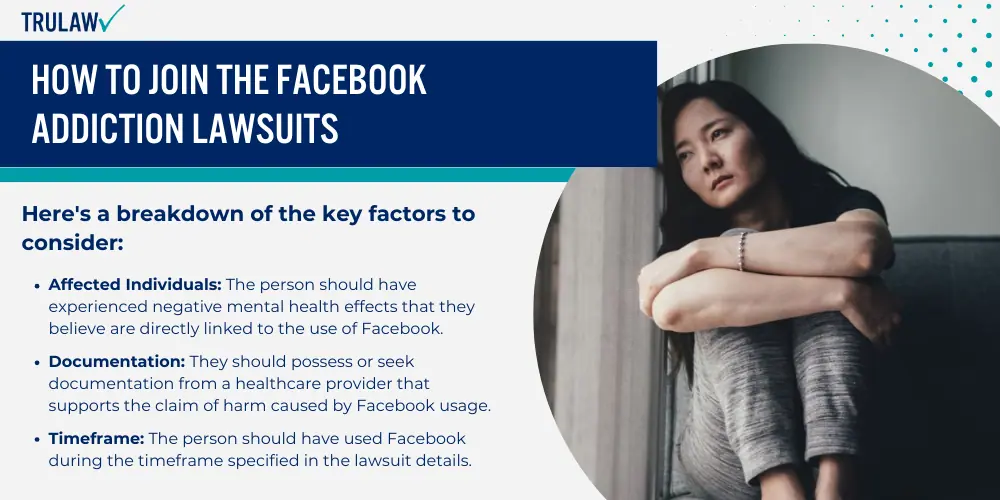
This section outlines the specific criteria for joining such a lawsuit and the procedural steps to get involved.
Criteria to Qualify for a Facebook Addiction Lawsuit
Before a person can join a lawsuit, they must understand whether they meet the necessary criteria.
Here’s a breakdown of the key factors to consider:
- Affected Individuals: The person should have experienced negative mental health effects that they believe are directly linked to the use of Facebook.
- Documentation: They should possess or seek documentation from a healthcare provider that supports the claim of harm caused by Facebook usage.
- Timeframe: The person should have used Facebook during the timeframe specified in the lawsuit details.
- Consumer Law Violations: There should be a connection between the individual’s case and any alleged violations of consumer protection laws that the lawsuit is based on.
Steps to Take to Join the Facebook Class Action MDL
Confirm your eligibility and find a participating lawyer.
First, check if the lawsuit applies to your situation.
Then, research and contact a lawyer actively involved in the class action against Facebook.
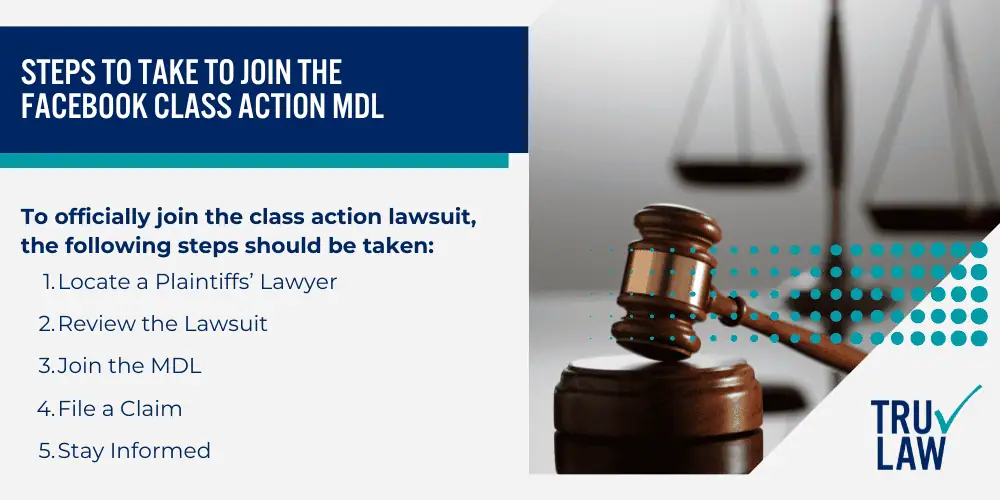
To officially join the class action lawsuit, the following steps should be taken:
- Locate a Plaintiffs’ Lawyer: Research and contact a lawyer participating in the class action against Facebook.
- Review the Lawsuit: The individual should review the details of the lawsuit to ensure it matches their situation.
- Join the MDL: If the suit is a multi-district litigation (MDL), the person must follow the process to become part of the larger grouping.
- File a Claim: They must file the legal paperwork through their attorney to join as a plaintiff.
- Stay Informed: Individuals should keep abreast of the lawsuit’s progress and comply with any requests from their lawyer to aid the case.
Social Media Harm Lawsuits Frequently Asked Questions
-
Individuals may pursue legal action through personal injury claims asserting that the platform caused or exacerbated their addiction, potentially leading to emotional or psychological harm.
Such claims might argue that Facebook had a duty to protect users from addictive and third-party content but failed to do so effectively.
-
Yes, there have been class action lawsuits against Facebook where plaintiffs have joined together to claim the social media platform caused mental health problems.
A notable example included allegations that the platform contributed to addictive behavior and negatively impacted the mental health of its users.
-
Compensation in social media addiction cases might encompass recovery of medical expenses, lost wages, and damages for emotional distress.
In some instances, punitive damages could also be awarded if a company’s neglect is particularly egregious.
-
While every case is unique and past success does not guarantee future results, there have been instances where plaintiffs have received monetary compensation for claims related to social media’s impact on children’s mental health.
Settlements might include financial awards for the individual harm suffered.
-
Suits against social media giants for emotional distress are often filed under the legal theories of negligence or intentional infliction of emotional distress.
These suits assert that the company’s action or inaction directly caused the user’s mental and emotional harm.
-
Several prominent law firms champion these cases, with experienced attorneys specializing in personal injury and class action suits.
These firms are recognized for their legal expertise and commitment to representing individuals in digital media-related litigation.

Managing Attorney & Owner
With over 25 years of legal experience, Jessica Paluch-Hoerman is an Illinois lawyer, a CPA, and a mother of three. She spent the first decade of her career working as an international tax attorney at Deloitte.
In 2009, Jessie co-founded her own law firm with her husband – which has scaled to over 30 employees since its conception.
In 2016, Jessie founded TruLaw, which allows her to collaborate with attorneys and legal experts across the United States on a daily basis. This hypervaluable network of experts is what enables her to share the most reliable, accurate, and up-to-date legal information with our readers!
Additional Social Media Harm Lawsuits resources on our website:
Here, at TruLaw, we’re committed to helping victims get the justice they deserve.
Alongside our partner law firms, we have successfully collected over $3 Billion in verdicts and settlements on behalf of injured individuals.
Would you like our help?
At TruLaw, we fiercely combat corporations that endanger individuals’ well-being. If you’ve suffered injuries and believe these well-funded entities should be held accountable, we’re here for you.
With TruLaw, you gain access to successful and seasoned lawyers who maximize your chances of success. Our lawyers invest in you—they do not receive a dime until your lawsuit reaches a successful resolution!
AFFF Lawsuit claims are being filed against manufacturers of aqueous film-forming foam (AFFF), commonly used in firefighting.
Claims allege that companies such as 3M, DuPont, and Tyco Fire Products failed to adequately warn users about the potential dangers of AFFF exposure — including increased risks of various cancers and diseases.
Depo Provera Lawsuit claims are being filed by individuals who allege they developed meningioma (a type of brain tumor) after receiving Depo-Provera birth control injections.
A 2024 study found that women using Depo-Provera for at least 1 year are five times more likely to develop meningioma brain tumors compared to those not using the drug.
Suboxone Tooth Decay Lawsuit claims are being filed against Indivior, the manufacturer of Suboxone, a medication used to treat opioid addiction.
Claims allege that Indivior failed to adequately warn users about the potential dangers of severe tooth decay and dental injuries associated with Suboxone’s sublingual film version.
Social Media Harm Lawsuits are being filed against social media companies for allegedly causing mental health issues in children and teens.
Claims allege that companies like Meta, Google, ByteDance, and Snap designed addictive platforms that led to anxiety, depression, and other mental health issues without adequately warning users or parents.
Transvaginal Mesh Lawsuits are being filed against manufacturers of transvaginal mesh products used to treat pelvic organ prolapse (POP) and stress urinary incontinence (SUI).
Claims allege that companies like Ethicon, C.R. Bard, and Boston Scientific failed to adequately warn about potential dangers — including erosion, pain, and infection.
Bair Hugger Warming Blanket Lawsuits involve claims against 3M — alleging their surgical warming blankets caused severe infections and complications (particularly in hip and knee replacement surgeries).
Plaintiffs claim 3M failed to warn about potential risks — despite knowing about increased risk of deep joint infections since 2011.
Baby Formula NEC Lawsuit claims are being filed against manufacturers of cow’s milk-based baby formula products.
Claims allege that companies like Abbott Laboratories (Similac) and Mead Johnson & Company (Enfamil) failed to warn about the increased risk of necrotizing enterocolitis (NEC) in premature infants.
Here, at TruLaw, we’re committed to helping victims get the justice they deserve.
Alongside our partner law firms, we have successfully collected over $3 Billion in verdicts and settlements on behalf of injured individuals.
Would you like our help?
